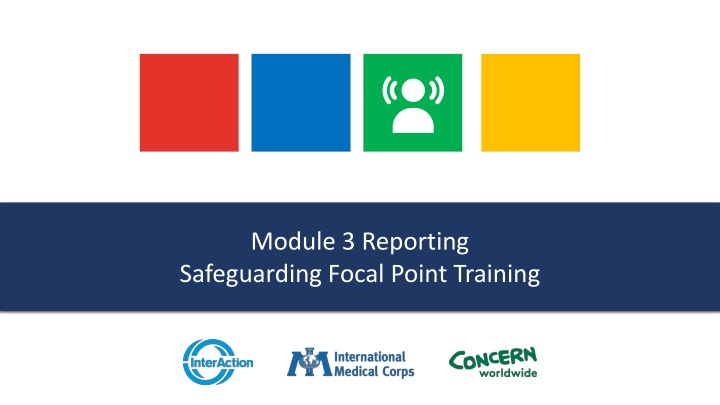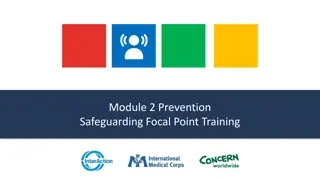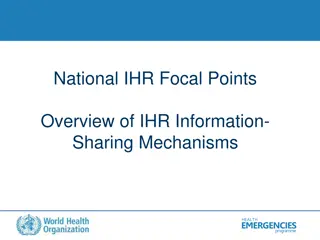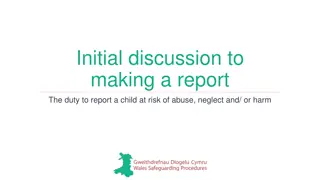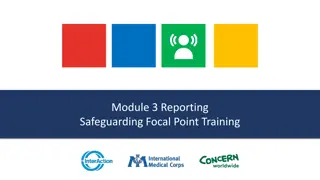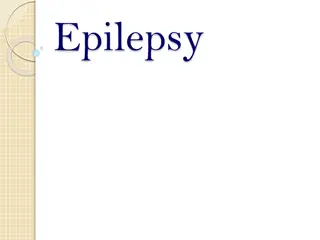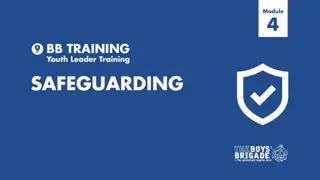Safeguarding Focal Point Training: Enhancing Reporting and Response Mechanisms
This training module focuses on equipping Safeguarding Focal Points (SFPs) with the knowledge and skills to enhance community-based feedback mechanisms, efficiently handle safeguarding complaints, and address barriers to reporting. Participants will also learn about data protection guidelines, including obtaining consent and managing information securely. The training emphasizes the importance of inclusive, empowering, and confidential feedback channels to ensure the safety and well-being of all individuals involved.
Download Presentation

Please find below an Image/Link to download the presentation.
The content on the website is provided AS IS for your information and personal use only. It may not be sold, licensed, or shared on other websites without obtaining consent from the author.If you encounter any issues during the download, it is possible that the publisher has removed the file from their server.
You are allowed to download the files provided on this website for personal or commercial use, subject to the condition that they are used lawfully. All files are the property of their respective owners.
The content on the website is provided AS IS for your information and personal use only. It may not be sold, licensed, or shared on other websites without obtaining consent from the author.
E N D
Presentation Transcript
Module 3 Reporting Safeguarding Focal Point Training
Learning Objectives SFPs will: Understand the concept and implementation of community-based feedback mechanisms and response mechanisms. Understand how to receive safeguarding complaints at field level and channel complaints to the appropriate reporting mechanism. Be aware of how to document and report barriers to reporting and seek advice/escalate concerns when required. Be aware of data protection issues and guidelines including asking for consent and how to share and manage information. SFP Training
Session 0: Refresher SFP Training
Ground Rules Ensure you have your preferred name showing. Please mute when others are speaking. Please keep your video on unless you have connection issues. Please use the chat box / or raise hand when you have questions. Only step away from your computer during assigned breaks. Please participate as much as possible! SFP Training
Session 1: Community-Based Feedback and Response Mechanisms SFP Training
Making Sure that the Mechanisms Work in the Context 3. Complaints The content of the distribution was not what you needed. The staff on the project are rude; they always stare when they visit. The wrong people are on the list of program participants. You heard that some women receive additional food rations because they are close friends with the distribution officer. 1. Characters 2. Channels Suggestion box WhatsApp group Hotline Home visit by female staff
Key Messages Every agency will have own approach to community-based feedback and response mechanisms, depending on their mode of operating, the context, resources, and policies. However, certain principles should apply to ensure that they are inclusive, empowering, and do no harm to users wanting to share concerns, particularly those relating to safeguarding. There should be multiple, accessible, safe, and confidential channels, chosen on the basis of consultations with communities. SFP Training
Session 2: Reporting Safeguarding Concerns SFP Training
Online Assignment |BOND Reporting Case Studies 1. What is a key recommendation that emerged from these case studies? SFP Training
Key Messages Responding to feedback and complaints can be complex and raise many difficult dilemmas. Well-functioning and appropriate report-handling mechanisms can help organizations address some of these safeguarding challenges. At a minimum, SFPs should be aware of the systems and procedures in place in their organization to manage sensitive cases in a safe, confidential, and transparent way. They should also know and how and where to escalate complaints. SFPs have an important role to play in ensuring staff, program participants, and their communities are aware of the available reporting channels. SFP Training
Session 3: Barriers to Reporting SFP Training
Key Messages There may be varied reasons why staff, communities, and program participants do not report safeguarding concerns. It is important to monitor and analyze barriers to reporting ranging from any physical or logistical barriers to cultural barriers. Mitigating actions should be identified. Multiple channels are needed to enable reports of safeguarding concerns, but informal channels, including monitoring visits, can also provide important opportunities for people to raise concerns. Many barriers to reporting can be linked back to poor design processes (lack of consultation with communities about their preferences for sharing concerns) and lack of information (for example about the organization, programs, expected behaviors, and ways to report concerns). SFP Training
Session 4: Additional Sessions SFP Training
Online Assignment |Data Protection and Record Data Protection and Record Keeping Keeping SFP Training
Wrap-up Every organization should have a feedback and response mechanism in place to receive safeguarding concerns. It may be difficult for people to raise concerns. Mechanisms should be context-specific and designed and implemented in collaboration with communities. Barriers to reporting should be analyzed and mitigation strategies considered. At a minimum, SFPs should be aware of the systems and procedures in place in their organization to manage sensitive cases in a safe, confidential, and transparent way and how/where to escalate complaints. SFP Training
